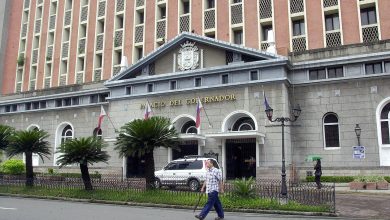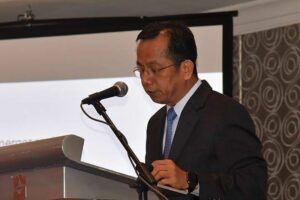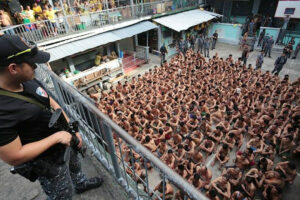Good governance and fighting poverty

At some point, he chaired the Board of Bantayog ng mga Bayani Foundation, that landscaped memorial center honoring those men and women of courage who fought the repressive martial law regime from 1972-1986. I was one of those student activists at the University of the Philippines at the height of martial law who were arrested and jailed. I escaped physical torture and death unlike the others whose names are now inscribed on the black granite Wall of Remembrance. Named in his honor is the Auditorium in the Museum where people can see various films relevant to those times of darkness.
He is no other than Alfonso T. Yuchengco, industrialist, business tycoon, educator, philanthropist, and diplomat, the patriarch of the Yuchengco family until his demise in April 2017.
It is difficult to talk about Ambassador Yuchengco without mentioning his thoughtful ways and his commitment to the cause of education and good government. And this year is his centenary. In his honor, the Yuchengco Center, whose president is my friend and fellow Collegian editor Dr. Milton B. Amayun, held the 17th Annual Ambassador Yuchengco Policy Seminar on May 23.
From as early as the introductory remarks of both Dr. Amayun and trustee former Prime Minister (PM) Cesar EA Virata, we heard fireworks about good governance and lifting the poor from poverty, the battle cries in many emerging countries like the Philippines.
Dr. Amayun expressed his initial optimism with his decision to come home in 2014 after spending 34 years working as a public health physician practically around the world, mostly in depressed communities in Asia, Africa, and Eastern Europe. He saw bright stars in the improving score of the Philippines on perceived corruption in Transparency International’s index, and everything positive expected from it.
He admitted he “was grossly mistaken.”
He was treated instead to a full menu of Janet Napoles’ fake projects and sham NGOs, “hulidap” incidents of fake arrests for extortion and bribery, the Mamasapano fiasco, the Dengvaxia scandal, PhilHealth anomalies, extra-judicial killings, the Pharmally plunder, and a host of other combined cases of corruption, incompetence, and abuse of power.
What differentiates Dr. Amayun’s litany of negative observations is that he offered some vision. His was more than a demand for outrage and embarrassment. He called for a clean election as well as avoidance of both vote-buying and vote-selling. He wanted to restore competence and vision to public service. The poor should remain the focus of social responsibility. A Christian, Dr. Amayun urged that Government should lead, instead of delegating social upliftment to either the Church or to charitable institutions.
PM Virata, for his part, zeroed in on the Ambassador’s patriotic commitment to the Philippines to serve as a beacon of good governance and political accountability. It was most fitting for PM Virata to have announced that for the next three years, the Yuchengco Center is targeting two of the six Sustainable Development Goals (SDG), namely, poverty and peace, justice and strong institutions.
He could not have been more spot on when he rolled out the basic rationale for good governance. Just before the pandemic, the Philippines was about to be reclassified from a lower middle-income country to an upper middle-income country, but missed it by a measly $300 million. It became a more difficult hurdle since then because the economy shrank due to the pandemic.
The former Prime Minister correctly pointed out that while our real GDP and per capita computation could be showing a decisive uptrend, we should be conscious that “there (remains) a great income inequality, that far too many Filipinos continue to be poor.”
The numbers are quite telling. PM Virata cited that around 23 million to 26 million Filipinos live below the poverty line. This is most disturbing in the context of an economy that used to grow continuously for over two decades until the pandemic of 2020-2022. This is undeniably a failure of economic and political governance. True, the magnitude of poverty has declined over the years, but it is equally true that the retreat is insufferably slow, glacial to some.
Hence, to PM Virata, good governance “must set the stage for the poor on their journey by opening up opportunities, setting and enforcing the rules of engagement applicable to all.”
The main speaker at the Policy Seminar of course was the indefatigable Mayor of Baguio City, Benjamin B. Magalong who started off his address by talking about righteous, authentic leadership. “Righteousness” is a big word and it is related to being morally right. Only when leadership is righteous can one claim authenticity of leadership.
Mayor Magalong then talked about the need for self-transformation. For him, an authentic leader knows how to discover himself. He does not aspire to be a leader, he aspires to make a difference. That is how one becomes a leader.
It was a long journey for Mayor Magalong, that journey from a temperamental leader to one with several realizations in life. To many, he was a dragon, some kind of a “fire-eating-bloodcurdling-kick-boxing-police character.” He could be both inspiring and nerve-wracking. It should not be surprising that the fear factor is something that is fully harnessed not only by military leaders but also civilian leaders. That could be more indicative of a lack of self-esteem and self-confidence. They are aware they are made of lesser mettle.
Mayor Magalong cited a specific turning point in his professional life. He was asked to chair the Board of Inquiry organized by the Department of Interior and Local Government to investigate what really happened to the so-called Fallen 44 SAF commandos in Mamasapano. He released the Board report that could have unruffled key public officials who pressured him to go easy. One of them even asked Magalong to modify some of the findings invoking “national security” as rationale.
He was definitely at a crossroad.
If he stood his ground and indicted the relevant officials, his career would be finished. If he changed the findings, he was promised princely reward. When he finally submitted the Board’s report, he flatly challenged the top-brass official: “Sir, kung gusto ninyong palitan ang aming findings, hindi po namin pipirmahan ‘yung nabagong report. Magre-resign po kami.” (Sir, if you want us to change our findings, we will not sign the new report. We will resign.)
For his tenacity, he managed to forge the most challenging events of his life “into a narrative of success, revealing a better self.”
His mantra has since then evolved into “governance beyond politics.”
In his own words, “this is a brand of governance that is anchored on doing the right thing in the right possible way even if it is unpopular.” It’s about integrity and competence. It’s about showing it in deeds and acts that are experienced day by day.
Seven components underlie the fight against poverty through good governance: transparency and accountability, efficient resource allocation, equitable service delivery, increased accessibility to socio-economic opportunities, combatting corruption, access to justice, and upholding human rights.
Mayor Magalong expressed his willingness not to seek another term as mayor of Baguio if a younger alternative steps forward. He was thinking of the next generation, and this generation’s legacy to them. For him, it’s not useful to talk about the incoming younger leadership. Rather, if they are ready today, opportunities should be open. The young generation is capable of creating change.
This is where Mayor Magalong is coming from when he decided to create a network of local chief executives who also believe in the principles of good governance. Over time, Mayor Magalong was hopeful such a network could snowball into a national movement to infect every level of the Government, especially at the local level, that good governance becomes the norm rather than the exception.
At this time, Mayor Magalong and other LGU heads who share and subscribe to the tenets of good governance may be in the minority. This could be challenging but one should recall the story of Joshua and Caleb in Numbers 13-14 who defied the fear of the other spies sent with them to Canaan. The majority wanted to avoid confronting the giants of the land, but Joshua and Caleb, just the two of them, declared: “Let us go up at once and occupy it, for we are well able to overcome it.”
If more Yuchengco Centers are around to give prominent platform to more and more champions of good governance, fighting poverty, though challenging, is not impossible.
Diwa C. Guinigundo is the former deputy governor for the Monetary and Economics Sector, the Bangko Sentral ng Pilipinas (BSP). He served the BSP for 41 years. In 2001-2003, he was alternate executive director at the International Monetary Fund in Washington, DC. He is the senior pastor of the Fullness of Christ International Ministries in Mandaluyong.




